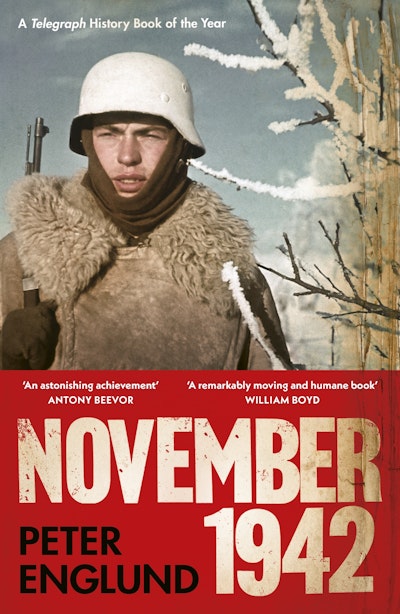- Published: 11 February 2025
- ISBN: 9781529923698
- Imprint: Vintage
- Format: Paperback
- Pages: 496
- RRP: $35.00
November 1942
An Intimate History of the Turning Point of the Second World War
- Published: 11 February 2025
- ISBN: 9781529923698
- Imprint: Vintage
- Format: Paperback
- Pages: 496
- RRP: $35.00
**PRAISE FOR THE BEAUTY AND THE SORROW** In four decades of studying war, I've never read such a remarkable book
Washington Post
A literary as well as a historical achievement
Guardian
Intense and bighearted. ... The accounts of [these] lives can be terrifying or stirring, but are most fully alive in Englund's accumulation of small moments, stray details
New York Times
A wonderfully wide and rich mosaic of personal experience from the First World War
Antony Beevor
Peter Englund is one of the finest writers of our time on the tactics, the killing and the psychology of war. In The Beauty and the Sorrow he superbly and humanely brings to life all the tragedy, chaos, death and gunsmoke of battle
Simon Sebag Montefiore
A haunting mosaic of the experiences of war. The layers of voices build to create a richly complex and rarely heard account of the First World War that lingers in the memory long after the final page. Immensely powerful
Juliet Gardiner
[Englund] conjures up the atmosphere over and over again with just a few stark words. I loved all the detail... inspiring
Margaret Forster
Like no other, this book brings out in a poignant and effective way the meaning of World War I for those who lived through it
Lawrence Freedman
By interweaving the detailed experiences of 39 individuals from all parts of the conflict, Englund presents an extraordinary panorama of this pivotal moment. A haunting narrative imaginatively conceived, brilliantly told
Julia Boyd
An astonishing achievement
Antony Beevor
This gripping and propulsive account, expertly translated by Graves in lyrical prose, recreates the daily uncertainty of war as experienced by regular people ... It's a monumental work of history
Publishers Weekly
Absolutely revelatory. A stunning tour de force. So much in here that is truly fresh and new. Englund chronicles the gripping tale of one month that changed everything in WWII, and it is so beautifully written and timeless. Once read, you'll want to return to this again and again
Damien Lewis
Majestic … This is an extraordinary evocation of a pivotal moment in the 20th century. Englund captures not only the gnawing tension, the moments of terror and the flinty endurance but also the fractal complexity of this global conflict. Resonantly written and utterly gripping, this book will stay with you
Sinclair MacKay
Succeed[s] in giving a very human (and, inevitably sometimes, inhuman) snapshot of events ... Thoroughly worth reading
Telegraph
Thought-provoking … Englund’s book … deserves an audience, to increase knowledge not only of this particular war, but also of the stupendous sacrifices and tragedies of all human conflicts
Sunday Times
Engrossing … Englund’s approach echoes Homer’s Iliad which tries to understand at once the mayhem of war, the forces that drive it and the feelings its violence leaves behind … Englund’s tour de force casts a long shadow into our present – and its raw voices haunt me still
Wall Street Journal
Extraordinary ... with a scrupulous and skilful hand [Englund] has created an original panorama of humankind's most destructive war
New York Times
The stories of the individual people featured make the global personal in an astonishing way
Alan Parks, Daily Express *Books of the 2023*
Superb ... a stimulating read
New Statesman
What makes Englund's work original and remarkable is his narrative technique, which could be called 'the mosaic method' ... A coherent and moving portrait of a world at war
BBC History Magazine
Brilliant [and] arresting ... The style is vivid and novelistic ... [November 1942's] complex multitude of narrative lines and the intensity in which they're presented make for the most absorbing and harrowing reading. It is a remarkably moving and humane book
William Boyd, Times Literary Supplement
This vivid chronicle of descent towards the abyss ... offers many thought-provoking insights ... Englund’s book, and his cast of characters, deserve an audience, to increase knowledge not only of this particular war, but also of the stupendous sacrifices and tragedies of all human conflicts
Max Hastings, Sunday Times
A vivid chronicle of descent towards the abyss
Max Hastings, Sunday Times
A vivid portrait of that critical month, compiling first-hand testimony from a remarkable range of people ... Their stories offer a brilliant snapshot of the reality of war: miserable, boring and brutal – but illuminated with moments of humanity, heroism and glorious absurdity.
Jane Shilling, Daily Mail


